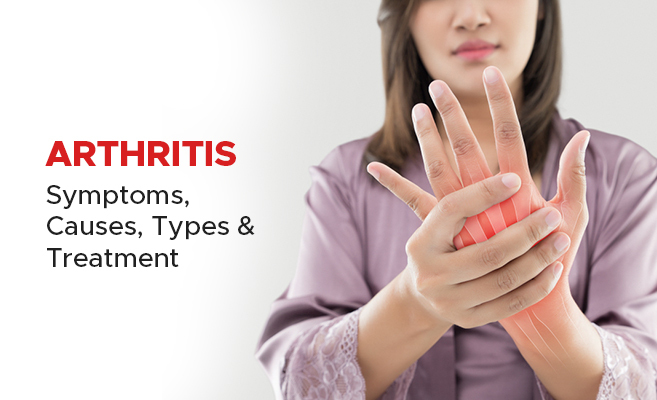Inflammation, stiffness, and discomfort in one or more joints are all referred to as symptoms of arthritis. It isn’t a single condition, as there are various types of arthritis such as Osteoarthritis, Rheumatoid Arthritis, and Juvenile Idiopathic Arthritis.
Millions of people in the world are believed to have arthritis, and it can affect individuals of all ages, including children and teenagers, although some forms of arthritis are more common in older people.
What Causes Arthritis Disease & Types, Treatment
Seeking Medical Attention
If you experience persistent joint pain that doesn’t subside after a few days, it’s important to consult with an orthopedic doctor. Identifying the cause of the pain is necessary for determining the appropriate treatment and self-help strategies.
While there is no cure for arthritis, recent advancements in treatments have significantly improved outcomes, especially for inflammatory arthritis types, where early intervention is beneficial.
Factors Contributing to Arthritis
Determining the cause of arthritis can be challenging, but factors such as genetic predisposition inherited from parents or grandparents may contribute to an increased risk. Arthritis can make life challenging by causing consistent pain and hindering mobility.
Symptoms can vary from week to week and even day to day. Conditions like osteoarthritis and rheumatoid arthritis are often long-term, but with proper treatment and lifestyle adjustments, symptoms can be managed.
The Structure of Joints
Where two or more bones meet, such as in the fingers, knees, and shoulders, is known as a joint. Bones move more easily because of the tough capsule that surrounds joints and contains lubricating fluid. Ligaments, which are like elastic bands, support joints.
The ends of bones in a joint are covered with cartilage, a smooth and tough tissue allowing easy movement. By responding to signals from the brain, muscles play a critical role in supporting joints.
Types of Arthritis and Their Characteristics
There are various types of arthritis, each with its characteristics. The most common form of arthritis causes roughness in the cartilage. It often affects older individuals, especially in the knees, hands, hips, and back.
Symptoms can be controlled with regular exercise, a healthy weight, and medicines like painkillers. In severe cases, surgery, including joint replacement, might be considered.
In India, there are many top-rated hospitals for joint replacement, especially in Delhi NCR. Cure My Knee is one of the good knee replacement hospitals in South Delhi. They have the top 15 orthopedic surgeons for knee, joint, and hip. If you have health insurance you take the benefit to get treatment free of cost.
You don’t need to worry if you do not have a health insurance policy because knee pain treatment in Delhi is affordable, and many people from the surrounding states come for the best orthopedic treatment and surgeries here.
Specific Types of Arthritis
Osteoarthritis: This form of arthritis is a long-lasting problem that mostly affects people in their middle and later years. This condition causes the cartilage (a tissue that cushions joints) to wear away. It can affect any joint, but it tends to affect the hands, knees, hips, or spine more frequently.
Knee replacement surgery and hip replacement surgeries are the most commonly performed procedures to cure joint arthritis. In these surgeries, damaged knee parts are replaced with strong durable artificial implants.
Rheumatoid Arthritis: An inflammatory type where the body’s immune system attacks healthy tissues, particularly the joints. Disease-modifying antirheumatic drugs (DMARDs) and biological therapies have the potential to cause swelling associated with arthritis within the body.
Gout: Characterized by painful swelling, commonly in the big toe. It results from too much uric acid in your blood, leading to the formation of crystals in joints. Medicines can help you lower uric acid levels and stop gout attacks.
Spondyloarthritis: Encompasses conditions causing pain and swelling around the spine joints. Ankylosing spondylitis involves inflammation leading to the growth of new bone in the spine. Medications and maintaining physical activity can help manage symptoms.
Psoriatic Arthritis: An autoimmune condition associated with psoriasis, causing joint swelling and stiffness. Treatments include DMARDs and biological therapies, along with psoriasis-specific treatments.
Juvenile Idiopathic Arthritis (JIA): Diagnosed when inflammatory arthritis occurs before the age of 16. Usually, it results in inflammation and joint pain in the hands, knees, ankles, elbows, and/or wrists. However, it might also impact other body parts. Early diagnosis and treatment can limit the damage.
When to Seek Medical Attention
Knowing when to visit a doctor is important. You should consult with a doctor if you experience persistent joint issues, unexplained pain, swelling, or difficulties completing routine tasks. Do not have any of these symptoms to avoid further complications.
Holistic Approach to Arthritis Care
Apart from medical treatments, self-management plays a crucial role in arthritis care. Regular, low-impact exercise, such as swimming or walking, can strengthen muscles and improve joint flexibility.
A balanced diet, weight management, and maintaining overall health are important. Understanding your condition empowers you to make informed decisions about treatment options.
Conclusion
In short, arthritis is a complex challenge that affects many people worldwide in various ways. Although there is no cure, medical treatments and surgeries give hope. The key is to act early, understand the different factors contributing to arthritis, and take a comprehensive approach to care.
There are treatments available, considering factors like joint structures and the type of arthritis. Getting timely medical help is crucial to managing fluctuating symptoms. A holistic approach involves combining medical treatments with self-care, focusing on exercise, a balanced diet, and overall health.
Working with healthcare professionals, such as physiotherapists, is essential for support. While arthritis impacts individuals differently, taking proactive steps, including addressing emotional well-being through open communication, can lead to a fulfilling life.
Also Read: dialysis travel nurse jobs

